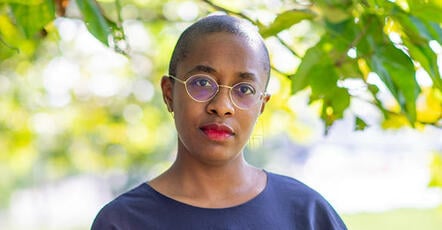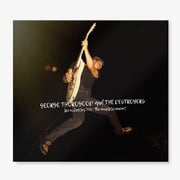New York, NY (Top40 Charts) Singer and composer Cécile McLorin Salvant, who began recording her Nonesuch debut album this week, has been named a MacArthur Fellow. Salvant was among the twenty-one new MacArthur Fellows for 2020, selected by the John D. and Catherine T. MacArthur Foundation and announced earlier this week. The annual fellowship, often referred to as the "
Genius" grant, offers an unrestricted award of $625,000 over five years to individuals who, in the Foundation's words, "have shown extraordinary originality and dedication in their creative pursuits and a marked capacity for self-direction."
Salvant, who is this year's youngest Fellow at thirty-one, said to the
Chicago Tribune's
Howard Reich: "I feel like this comes at a time when I'm rather young. I think it's also like a push: Now you have to step it up. To me, it's almost an acknowledgment of my potential more than anything else. I don't see this as a celebration of a career. I see this as a confirmation: You have potential, we see something in you."
Among this year's recipients, in addition to Salvant, are people working in diverse fields from evolutionary genetics and developmental biology, to environmental health and experimental physics, to documentary filmmaking and poetry, and speculative fiction. All Fellows were selected for their exceptional creativity, promise for important future advances based on a track record of significant accomplishments, and potential for the Fellowship to facilitate subsequent creative work.
"In the midst of civil unrest, a global pandemic, natural disasters, and conflagrations, this group of twenty-one exceptionally creative individuals offers a moment for celebration," said MacArthur Fellows managing director Cecilia Conrad. "They are asking critical questions, developing innovative technologies and public policies, enriching our understanding of the human condition, and producing works of art that provoke and inspire us."
Cécile McLorin Salvant is a singer and composer bringing historical perspective, a renewed sense of drama, and an enlightened musical understanding to both jazz standards and her own original compositions. Classically trained, steeped in jazz, blues and folk, and drawing from musical theater and vaudeville, Salvant embraces a wide-ranging repertoire that broadens the possibilities for live performance.
Salvant's nearly four-octave vocal range—from a bold, husky low register to clear high tones—animates her performances in a variety of configurations, from the spare duets for voice and piano featured on her album The Window (2018), to the instrumental trios on For One to Love (2015), to orchestral ensembles and her work with the all-female group Artemis. She locates her renditions of standards and new original compositions within a Black, feminist, yet global framework. In her fresh interpretations of lesser-known works, such as Josephine Baker's "Si J'Étais Blanche" (If I Were White) and Bert Williams's "Nobody," Salvant demonstrates a deep psychological and emotional engagement with the lyrics, modulating her voice from sharp-edged wit to sorrow and heartbreak as she dissects the painful past in which these works were born. Her unreleased work Ogresse is an ambitious long-form song cycle that showcases Salvant's storytelling ability and theatricality. Salvant pairs her original lyrics for a cast of characters—all of which she sings—with an orchestral score that blends baroque elements with bluegrass and jazz. Based on oral fairy tales from the nineteenth century, Ogresse is a narrative that explores the nature of freedom and desire in a racialized, patriarchal world.
Salvant studied at the Université
Pierre Mendès-France. Her additional albums include Cécile (2010), WomanChild (2014), and Dreams and Daggers (2017). She has performed at such national and international venues and festivals as the Newport Jazz Festival, the Monterey Jazz Festival, the Village Vanguard, and the Kennedy Center. Salvant is also a visual artist. Details of her Nonesuch debut will be announced in early 2021.























